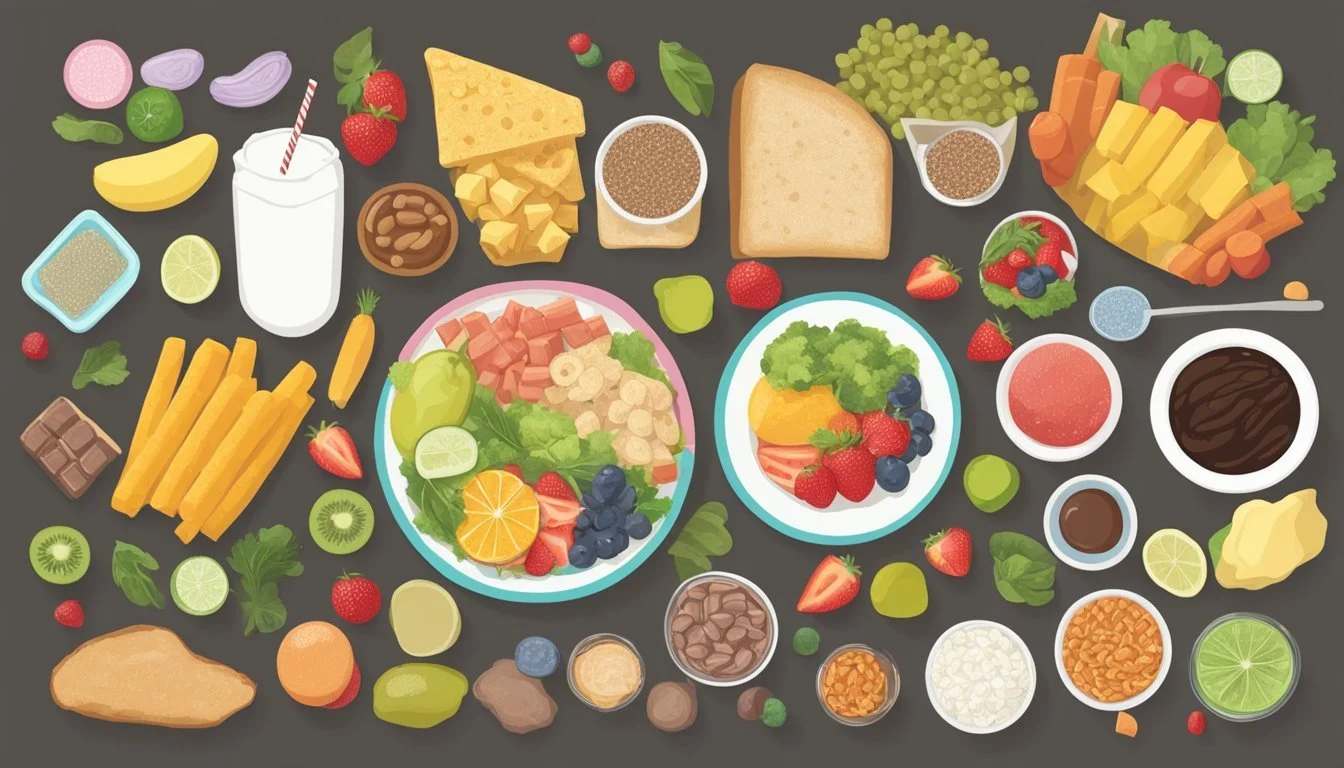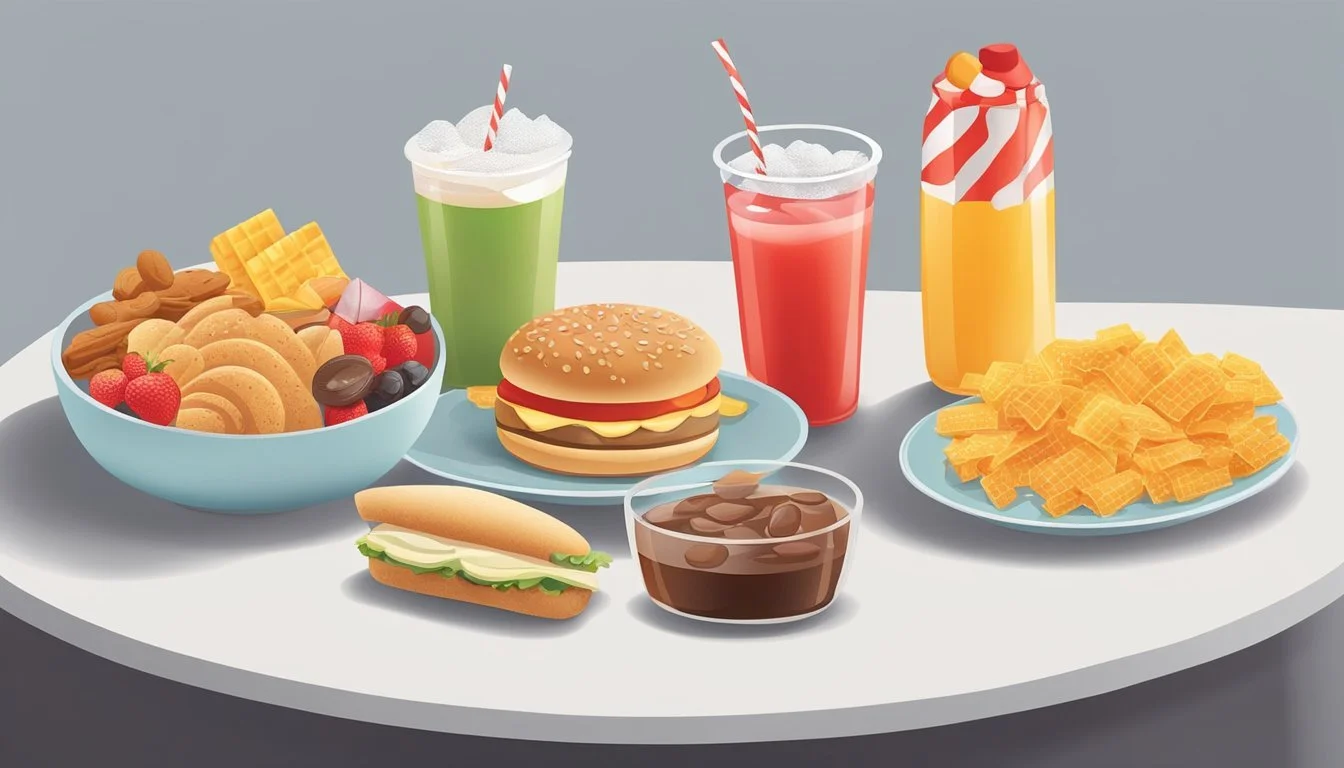Surprising Foods to Avoid with Diabetes: Protect Your Blood Sugar
Managing diabetes requires careful attention to dietary choices. Certain foods can significantly impact blood sugar levels and overall health for those with diabetes. By avoiding or limiting specific food types, individuals with diabetes can better control their blood glucose, reduce complications, and improve their quality of life.
A diabetes-friendly diet focuses on nutrient-dense foods while minimizing those that can cause rapid spikes in blood sugar. This approach often aligns with general healthy eating guidelines, benefiting not only blood glucose management but also heart health and weight control. Understanding which foods to avoid or consume in moderation is a crucial step in developing effective diabetes management strategies.
Adopting a diabetes-appropriate diet doesn't mean completely eliminating all favorite foods. Instead, it involves making informed decisions about portion sizes and frequency of consumption. With proper education and guidance, people with diabetes can create a balanced meal plan that supports their health goals while still enjoying a variety of tasty and satisfying foods.
Understanding Diabetes
Diabetes affects how the body processes glucose, impacting blood sugar regulation. Proper nutrition plays a crucial role in managing this condition effectively.
The Role of Diet in Managing Blood Sugar Levels
Diet directly influences blood glucose levels in people with diabetes. Carbohydrates have the most significant effect, as they break down into sugar during digestion.
The glycemic index (GI) measures how quickly foods raise blood sugar. Low-GI foods are preferable for diabetes management. These include whole grains, legumes, and non-starchy vegetables.
Protein and fat have minimal impact on blood sugar but can affect overall health. Balanced meals with appropriate portions help maintain stable glucose levels.
Monitoring carbohydrate intake and choosing nutrient-dense foods are key strategies. This approach supports better blood sugar control and overall health in diabetes.
Types of Diabetes and Nutritional Impacts
Type 1 and type 2 diabetes have distinct nutritional considerations. Type 1 diabetes requires insulin therapy and careful meal planning to match food intake with insulin doses.
Type 2 diabetes often involves insulin resistance. Diet plays a crucial role in managing this condition. Weight loss through a balanced diet can improve insulin sensitivity.
For both types, consistent carbohydrate intake helps stabilize blood sugar. Fiber-rich foods slow digestion and glucose absorption, aiding in better control.
Meal timing is important, especially for those on insulin. Regular, evenly spaced meals help prevent extreme blood sugar fluctuations.
Individualized nutrition plans, developed with healthcare providers, are essential for effective diabetes management.
Key Components of a Balanced Diet for Diabetes
A balanced diet for diabetes management focuses on nutrient-rich foods that help control blood sugar levels while providing essential nutrition. Careful attention to macronutrients, fiber, and micronutrients is crucial for overall health and glucose regulation.
Macro and Micronutrient Overview
Macronutrients form the foundation of a diabetes-friendly diet. Carbohydrates, proteins, and fats play distinct roles in blood sugar management and overall nutrition.
Carbohydrates have the most significant impact on blood glucose. Complex carbs from whole grains, vegetables, and legumes are preferred over simple sugars.
Proteins help maintain muscle mass and provide satiety without drastically affecting blood sugar. Lean meats, fish, eggs, and plant-based sources are excellent choices.
Fats, particularly healthy unsaturated fats, support hormone function and nutrient absorption. Sources include avocados, nuts, seeds, and olive oil.
Micronutrients like vitamins and minerals, while needed in smaller amounts, are essential for various bodily functions and may help prevent diabetes-related complications.
Understanding Carbohydrates and Fiber
Carbohydrates are the primary nutrient affecting blood glucose levels. Managing carb intake is crucial for diabetes control.
Complex carbohydrates, found in whole grains, vegetables, and legumes, are preferable as they're digested more slowly. This gradual digestion helps prevent rapid blood sugar spikes.
Fiber, a type of carbohydrate, is particularly beneficial. It slows digestion, improves blood sugar control, and promotes feelings of fullness. Aim for 25-30 grams of fiber daily from sources like:
Whole grains (oats, quinoa, brown rice)
Vegetables (broccoli, carrots, sweet potatoes)
Fruits (berries, apples, pears)
Legumes (beans, lentils, chickpeas)
Monitoring portion sizes and spreading carbohydrate intake throughout the day can help maintain stable blood sugar levels.
The Importance of Proteins and Healthy Fats
Proteins are essential for tissue repair, immune function, and maintaining muscle mass. They have minimal impact on blood sugar levels, making them a valuable component of a diabetes diet.
Good protein sources include:
Lean meats (chicken, turkey, lean beef)
Fish (salmon, tuna, mackerel)
Low-fat dairy products
Plant-based options (tofu, tempeh, legumes)
Healthy fats, particularly polyunsaturated and monounsaturated fats, are crucial for hormone production and nutrient absorption. They can also help improve insulin sensitivity.
Incorporate these healthy fat sources:
Avocados
Nuts (almonds, walnuts, pistachios)
Seeds (chia, flax, pumpkin)
Olive oil
Fatty fish (salmon, sardines, mackerel)
Balancing protein and healthy fats with carbohydrates can help stabilize blood sugar levels and provide sustained energy throughout the day.
Inclusion of Vitamins and Minerals
Vitamins and minerals play vital roles in metabolism, immune function, and overall health. People with diabetes may have increased needs for certain micronutrients.
Key vitamins and minerals for diabetes management include:
Vitamin D: Supports insulin sensitivity and immune function
B vitamins: Aid in energy metabolism and nerve health
Magnesium: Helps regulate blood sugar and supports insulin function
Chromium: May improve insulin sensitivity
Zinc: Supports immune function and wound healing
A varied diet rich in colorful fruits and vegetables, whole grains, and lean proteins can provide many essential micronutrients. Some individuals may need supplements, but this should be discussed with a healthcare provider.
Adequate hydration is also crucial for nutrient transport and overall health. Water, unsweetened tea, and low-fat milk are excellent beverage choices for people with diabetes.
Foods to Limit or Avoid with Diabetes
Managing diabetes involves careful food choices. Certain foods can negatively impact blood sugar levels and overall health. It's important to be aware of these items and limit their consumption.
High-Sugar Foods and Beverages
Sugar-sweetened beverages pose a significant risk for people with diabetes. These drinks can cause rapid spikes in blood sugar levels. Sodas, energy drinks, and sweetened teas are best avoided.
Baked goods like cookies, cakes, and pastries are also high in sugar. They provide little nutritional value and can lead to weight gain. Fruit juices, even those labeled "100% juice," contain concentrated sugars and should be consumed sparingly.
Candies and chocolate bars are obvious sources of added sugars. However, many seemingly healthy foods like flavored yogurts, granola bars, and breakfast cereals can also contain high amounts of hidden sugars.
Refined Carbohydrates and Their Impact
White bread, pasta, and rice are refined carbohydrates that can quickly raise blood sugar levels. These foods have been stripped of fiber and nutrients during processing.
Highly processed snack foods like crackers and pretzels fall into this category. They offer little nutritional benefit and can lead to rapid blood sugar fluctuations.
Switching to whole grain alternatives can provide more fiber and nutrients. Brown rice, whole wheat bread, and quinoa are better choices for managing diabetes.
The Risk of Excessive Saturated and Trans Fats
Foods high in saturated fats can increase cholesterol levels and the risk of heart disease. This is particularly concerning for people with diabetes, who already have an elevated risk of cardiovascular issues.
Red meat, full-fat dairy products, and tropical oils like coconut oil are high in saturated fats. These should be consumed in moderation.
Trans fats, found in some fried foods and baked goods, are especially harmful. They raise bad cholesterol levels while lowering good cholesterol. Many countries have banned artificial trans fats, but some products may still contain them.
Avoiding Processed and Sodium-Rich Foods
Processed foods often contain high levels of sodium, which can raise blood pressure. This is a concern for people with diabetes, who are at increased risk for hypertension.
Canned soups, frozen dinners, and packaged snacks are common sources of excess sodium. Fast food meals are also typically high in salt, saturated fats, and calories.
Deli meats and processed cheeses can be surprisingly high in sodium. Opting for fresh, whole foods and preparing meals at home allows for better control over sodium intake.
Understanding Sugar Alcohols and Artificial Sweeteners
Sugar-free foods often contain sugar alcohols or artificial sweeteners. While these can be useful for managing carbohydrate intake, they should be consumed in moderation.
Sugar alcohols like sorbitol and xylitol can cause digestive issues in some people. They may also still have a small effect on blood sugar levels.
Artificial sweeteners don't directly affect blood sugar, but their long-term health effects are still being studied. Some research suggests they may alter gut bacteria and potentially impact insulin sensitivity.
It's important to read labels carefully and understand the impact of these sweeteners on individual blood sugar responses.
Choosing the Right Beverages
Beverage choices play a crucial role in managing diabetes. Selecting appropriate drinks can help maintain stable blood sugar levels and support overall health.
The Impact of Alcohol on Blood Sugar
Alcohol can affect blood sugar in unpredictable ways. It may cause a rapid drop in glucose levels, especially when consumed on an empty stomach. People with diabetes should limit alcohol intake and never drink without food. Beer and sweet wines contain more carbohydrates, potentially raising blood sugar. Opt for dry wines or spirits in moderation if choosing to drink. Always consult a doctor about safe alcohol consumption with diabetes.
Alcohol can also interfere with diabetes medications and impair judgment, making it harder to recognize low blood sugar symptoms. It's essential to monitor glucose levels closely when drinking and have a plan for potential hypoglycemia.
Healthy Choices: Water, Tea, and Coffee
Water is the ideal beverage for people with diabetes. It's calorie-free, helps maintain hydration, and doesn't impact blood sugar. Sparkling water or water infused with fruits can add variety without extra carbs.
Unsweetened tea and coffee are excellent options. Both contain antioxidants that may improve insulin sensitivity. Green tea is particularly beneficial, potentially lowering the risk of type 2 diabetes. Black coffee can be consumed in moderation, but adding milk or sugar increases carbohydrate content.
Herbal teas offer flavor without calories or caffeine. Some, like chamomile, may have additional health benefits. For milk alternatives, choose unsweetened versions to minimize carbohydrate intake.
Meal Planning Strategies
Effective meal planning is crucial for managing diabetes. It helps control blood sugar levels and promotes overall health. Key strategies include balancing nutrients and managing portion sizes.
Planning Balanced Meals
The Diabetes Plate method simplifies meal planning. Fill half the plate with non-starchy vegetables like broccoli or spinach. Reserve a quarter for lean protein such as chicken or fish. The remaining quarter is for whole grains or starchy vegetables.
Include a variety of colorful fruits and vegetables to ensure a range of nutrients. Choose whole grains over refined options. These provide more fiber and help regulate blood sugar.
Incorporate healthy fats in moderation. Sources include avocados, nuts, and olive oil. Limit added sugars and processed foods, which can cause blood sugar spikes.
Portion Control and Frequency
Controlling portion sizes is essential for managing diabetes. Use measuring cups or a food scale to ensure accurate portions. Smaller plates can help visually manage serving sizes.
Aim for consistent meal times and sizes. This helps maintain steady blood sugar levels throughout the day. Consider eating smaller, more frequent meals instead of three large ones.
Snacks can be part of a healthy diabetes meal plan. Choose nutrient-dense options like Greek yogurt with berries or carrot sticks with hummus. These provide sustained energy and help prevent blood sugar dips between meals.
Be mindful of carbohydrate intake at each meal. Spread carbs evenly throughout the day to avoid large spikes in blood sugar.
Diabetes-Friendly Foods
Selecting the right foods is crucial for managing diabetes effectively. A balanced diet focused on nutrient-rich options can help control blood sugar levels and support overall health.
Fruits and Vegetables: Making Smart Choices
Non-starchy vegetables are excellent choices for people with diabetes. These include leafy greens, broccoli, cauliflower, and bell peppers. They're low in calories and carbohydrates while high in vitamins, minerals, and fiber.
Berries are among the best fruits for diabetics. Strawberries, blueberries, and raspberries are packed with antioxidants and have a lower glycemic index compared to other fruits.
Citrus fruits like oranges and grapefruits provide vitamin C and fiber. However, portion control is important as fruits contain natural sugars.
Choosing Healthy Proteins and Fats
Lean proteins are essential for a diabetes-friendly diet. Fish such as salmon, sardines, and tuna are rich in omega-3 fatty acids, which may help reduce inflammation and improve heart health.
Skinless poultry, eggs, and lean cuts of beef or pork are good protein sources. Plant-based proteins like legumes and nuts offer both protein and fiber.
Healthy fats from sources like olive oil, avocados, and nuts can help manage blood sugar levels. These fats also promote satiety and support overall cardiovascular health.
Whole Grains and High-Fiber Food Selections
Whole grains are preferable to refined grains for people with diabetes. Options like quinoa, brown rice, and whole wheat bread provide more nutrients and fiber than their refined counterparts.
High-fiber foods are beneficial for blood sugar control. Legumes, such as lentils and chickpeas, are excellent sources of both fiber and protein.
Oats are a versatile whole grain rich in beta-glucan, a type of fiber that may help improve insulin sensitivity. Incorporating a variety of whole grains and high-fiber foods can contribute to better blood sugar management.
Understanding Food Labels and Ingredients
Food labels provide crucial information for managing diabetes. Knowing how to interpret nutrition facts and identify hidden ingredients helps make informed dietary choices.
Decoding Nutrition Facts and Serving Sizes
The Nutrition Facts panel is a key tool for diabetes management. It displays the serving size, which is essential for accurate carbohydrate counting.
Calories, total carbohydrates, and fiber are important numbers to note. The total carbohydrate value includes starches, sugars, and fiber.
People with diabetes should pay attention to sodium content. The American Diabetes Association recommends limiting sodium intake to less than 2,300 mg per day.
Look for products with lower saturated fat and cholesterol levels. These can impact heart health, a concern for many with diabetes.
Identifying Hidden Sugars and Unhealthy Fats
Ingredients are listed in descending order by weight. Watch for added sugars, which may appear under various names like high fructose corn syrup, dextrose, or maltose.
Sugar alcohols, often found in "sugar-free" products, can affect blood glucose levels. They're typically listed separately from sugars on the label.
Trans fats, listed as "partially hydrogenated oils" in ingredients, should be avoided. They can raise bad cholesterol levels and increase heart disease risk.
Look out for hidden sources of unhealthy fats in packaged foods, salad dressings, and canned soups. Opt for products with healthier fat sources like olive oil or avocado oil.
Special Considerations for Managing Diabetes
Managing diabetes effectively requires attention to weight control, illness, and stress. These factors can significantly impact blood sugar levels and overall health outcomes for people with diabetes.
Managing Weight for Diabetes Control
Maintaining a healthy weight is crucial for diabetes management. Excess weight can increase insulin resistance, making it harder to control blood sugar levels. A balanced diet and regular exercise are key components of weight management for diabetics.
Portion control plays a vital role in weight management. Using smaller plates and measuring food can help prevent overeating. Choosing nutrient-dense, low-calorie foods like vegetables, lean proteins, and whole grains can aid in weight loss or maintenance.
Regular physical activity helps burn calories and improve insulin sensitivity. Aim for at least 150 minutes of moderate-intensity exercise per week. Activities like brisk walking, swimming, or cycling are excellent options for diabetics.
Managing Diabetes During Illness and Stress
Illness and stress can cause blood sugar levels to fluctuate, making diabetes management more challenging. During these times, it's essential to monitor blood glucose more frequently and adjust medication as needed.
Stress hormones can raise blood sugar levels. Stress management techniques such as deep breathing, meditation, or yoga can help keep stress in check. Regular exercise also acts as a natural stress reliever and helps stabilize blood sugar.
When ill, it's important to stay hydrated and continue eating regular meals if possible. Keep a supply of easy-to-digest foods on hand, such as crackers, broth, and gelatin. Never skip diabetes medications, even if unable to eat normally.
Connecting With Healthcare Professionals
Professional guidance is crucial for managing diabetes through diet. Experts can provide personalized advice and support to help individuals make informed food choices.
Working with a Dietitian or Nutritionist
Dietitians and nutritionists specializing in diabetes can create tailored meal plans. They assess individual needs, considering factors like blood sugar levels, medications, and lifestyle.
These professionals educate patients on portion control and carbohydrate counting. They also help interpret food labels and offer strategies for eating out.
Regular appointments allow for adjustments to dietary plans as needed. Dietitians can recommend specific foods to include or avoid based on a person's health status.
Staying Informed: Resources and Support Groups
The American Diabetes Association offers comprehensive resources on diabetes management. Their website provides nutrition guides, recipes, and meal planning tools.
Local diabetes support groups provide opportunities to share experiences and tips. Many hospitals and community centers host these meetings regularly.
Online forums and social media groups connect individuals with diabetes worldwide. These platforms often share the latest research and dietary trends.
Diabetes education classes teach essential skills for managing the condition. Topics typically include nutrition, exercise, and blood sugar monitoring.










